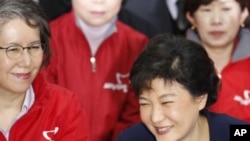South Korea's ruling conservatives have scored an upset victory in a nationwide legislative election. The New Frontier (Saenuri) Party, along with minor parties on the right, are to retain control of the National Assembly for the next four years.
Economic issues, a spying scandal, and personalities outweighed national security concerns in South Korea's fiercely fought parliamentary election.
An alliance of liberal parties failed to wrest control of the 300-seat National Assembly from the conservatives.
North Korea made no secret of its preference for an opposition victory here, saying voters should choose “peace and democracy” and “deal a heavy blow to pro-U.S. warlike forces.”
A professor of international politics at Chung-ang University, Lee Cho-won, says South Korean voters have become immune to such rhetoric from Pyongyang.
Lee says both of the major parties in South Korea also did not raise the issue of the North's impending missile launch, thus it had no significant impact on the election's outcome.
The opposition attacked President Lee Myung-bak, who cannot run for re-election in December, for widening the gap between the wealthy and the underprivileged since taking office in 2008. It also criticized his administration's support for the recently ratified trade agreement with the United States.
Another election issue: a still-unfolding political scandal implicating the presidential Blue House in spying on political opponents, civic groups, labor activists and journalists.
The administration responded that 80 percent of the cases dated to the previous presidency of Roo Moo-hyun, whose supporters are now in the opposition.
The main opposition Democratic United Party found its image damaged after nominating a candidate with a track record of highly offensive satirical comments.
On a popular Internet radio show, the candidate, Kim Yong-min, had called for top U.S. officials to be raped or murdered and suggested kidnapping and executing American troops in South Korea. He has called for the eradication of the country's powerful Protestant church and offended other constituencies, including the elderly.
Kim lost his bid to gain a seat in the National Assembly.
Voters were able to make separate selections for individual candidates and parties for proportional representation seats.
The election gives a boost to the New Frontier Party, hoping to retain the presidency. It changed its name from the Grand National Party in February, in a bid to revitalize its image.
This is the first time in two decades the legislative and presidential elections are being held in the same year in a country known for its volatile political environment.
The current front-runner to succeed President Lee is the leader of the New Frontier Party, Park Geun-hye. She is the daughter of former president Park Chung-hee, whose 18 years of autocratic rule ended when he was assassinated in 1979 by his own intelligence chief.
Possible strong challengers from the left include former President Roh's chief of staff, lawyer Moon Jae-in. He won a legislative seat in the polling in Busan, the country's second largest city.
Eyes are also on the well-known entrepreneur turned academic, Ahn Chul-soo. He has yet to declare whether he will run for president.
Ahn's only involvement in this election was in a video urging people to vote.
Holding stuffed animal toys and playing off the popularity of the Angry Birds video game, Ahn says it is time for the good birds to throw themselves at the castle to get at the solid establishment's bad pigs.
Recent public-opinion polls show Ahn and Moon as the two most formidable challengers to Park among all major potential candidates.
News
South Korean Conservatives Score Upset Parliamentary Election Victory
- By Steve Herman





